Items filtered by date: January 2024
Plantar Warts and HPV Strains
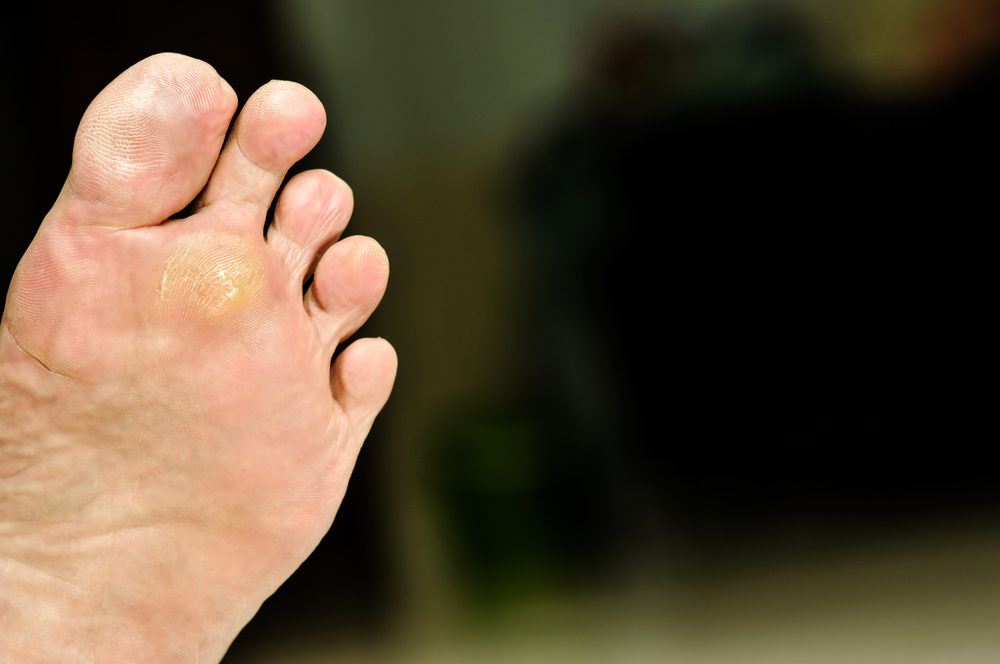
Plantar warts are a type of skin growth on the bottom of the foot caused by human papillomavirus, or HPV, infection. There are many types of HPV, and some of them are linked to skin warts. Plantar warts are a frequent type of skin wart. Because plantar warts can be uncomfortable, many people seek treatment from podiatrists. Plantar warts can be difficult to treat, and many treatments do not work. Different types of HPV are linked to different warts, and understanding which type causes the wart can help improve treatment and reduce side effects. If you or your child has developed a plantar wart, it is suggested that you schedule an appointment with a podiatrist who can guide you toward the treatment option that is right for you.
Plantar warts can be very uncomfortable. If you need your feet checked, contact Elliot T. Udell, DPM from New York. Our doctor will assist you with all of your foot and ankle needs.
About Plantar Warts
Plantar warts are the result of HPV, or human papillomavirus, getting into open wounds on the feet. They are mostly found on the heels or balls of the feet.
While plantar warts are generally harmless, those experiencing excessive pain or those suffering from diabetes or a compromised immune system require immediate medical care. Plantar warts are easily diagnosed, usually through scraping off a bit of rough skin or by getting a biopsy.
Symptoms
- Lesions on the bottom of your feet, usually rough and grainy
- Hard or thick callused spots
- Wart seeds, which are small clotted blood vessels that look like little black spots
- Pain, discomfort, or tenderness of your feet when walking or standing
Treatment
- Freezing
- Electric tool removal
- Laser Treatment
- Topical Creams (prescription only)
- Over-the-counter medications
To help prevent developing plantar warts, avoid walking barefoot over abrasive surfaces that can cause cuts or wounds for HPV to get into. Avoiding direct contact with other warts, as well as not picking or rubbing existing warts, can help prevent the further spread of plantar warts. However, if you think you have developed plantar warts, speak to your podiatrist. He or she can diagnose the warts on your feet and recommend the appropriate treatment options.
If you have any questions please feel free to contact our office located in Hicksville, NY . We offer the newest diagnostic and treatment technologies for all your foot and ankle needs.
Custom-Made Orthotics for Foot Pain
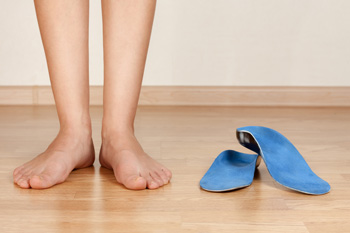
Custom-made orthotics are a valuable solution for alleviating foot pain and addressing various foot conditions. These personalized shoe inserts are designed to provide optimal support and alignment for an individual's unique foot structure and gait patterns. Custom orthotics offer precise support tailored to your specific needs. They are crafted based on a detailed assessment of your foot anatomy, including arch height, pronation, and other biomechanical factors. This ensures they provide the right level of support where needed, redistributing pressure evenly, and reducing strain on problematic areas. Custom orthotics can also improve alignment and stability. Correcting imbalances in your feet, ankles, or legs can reduce the stress on joints and muscles, promoting a more natural and efficient walking or running pattern. Furthermore, orthotics can alleviate pain caused by plantar fasciitis, bunions, or flat feet. They can provide cushioning and shock absorption, reducing discomfort during daily activities or sports. If you have persistent foot pain, it is suggested that you schedule an appointment with a podiatrist to discuss whether custom-made orthotics are a viable option for you.
If you are having discomfort in your feet and would like to try orthotics, contact Elliot T. Udell, DPM from New York. Our doctor can provide the care you need to keep you pain-free and on your feet.
What Are Orthotics?
Orthotics are inserts you can place into your shoes to help with a variety of foot problems such as flat feet or foot pain. Orthotics provide relief and comfort for minor foot and heel pain but can’t correct serious biomechanical problems in your feet.
Over-the-Counter Inserts
Orthotics come in a wide variety of over-the-counter inserts that are used to treat foot pain, heel pain, and minor problems. For example, arch supports can be inserted into your shoes to help correct overarched or flat feet, while gel insoles are often used because they provide comfort and relief from foot and heel pain by alleviating pressure.
Prescription Orthotics
If over-the-counter inserts don’t work for you or if you have a more severe foot concern, it is possible to have your podiatrist prescribe custom orthotics. These high-quality inserts are designed to treat problems such as abnormal motion, plantar fasciitis, and severe forms of heel pain. They can even be used to help patients suffering from diabetes by treating foot ulcers and painful calluses and are usually molded to your feet individually, which allows them to provide full support and comfort.
If you are experiencing minor to severe foot or heel pain, it’s recommended to speak with your podiatrist about the possibilities of using orthotics. A podiatrist can determine which type of orthotic is right for you and allow you to take the first steps towards being pain-free.
If you have any questions please contact our office located in Hicksville, NY . We offer the newest diagnostic and treatment technologies for all your foot and ankle needs.
Common Reasons Why Feet Can Swell
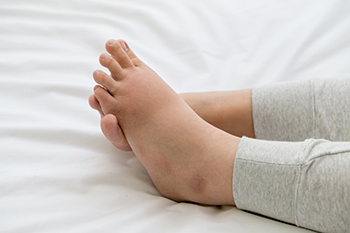
Swollen feet, a frequent and uncomfortable condition, can be triggered by a variety of factors. One of the most common causes is prolonged standing or sitting, which can cause fluid to accumulate in the lower extremities. Similarly, high salt intake can lead to water retention, resulting in swollen feet. Pregnancy is another well-known cause of foot swelling, due to increased blood volume and pressure on leg veins. Certain medications, like those for hypertension or hormone therapy, may contribute to edema. Injuries, such as sprained ankles or fractures, can also result in localized foot swelling. Additionally, underlying medical conditions like heart disease, kidney problems, or venous insufficiency can lead to edema in the feet. Lymphedema, a condition involving impaired lymphatic system function, is another possible cause. Recognizing the common causes of swollen feet is vital, as it can help you determine whether it is a benign issue or a sign of an underlying health problem. If you are concerned about persistent foot swelling, it is suggested that you consult a podiatrist for a proper diagnosis and guidance on managing the condition.
Swollen feet can be a sign of an underlying condition. If you have any concerns, contact Elliot T. Udell, DPM of New York. Our doctor can provide the care you need to keep you pain-free and on your feet.
Swollen feet are a common ailment among pregnant women and people who stand or sit for extended periods. Aging may increase the possibility of swollen feet and patients who are obese often notice when their feet are swelling too. There may be medical reasons why swollen feet occur:
- Phlebitis - A condition that causes the veins to become inflamed and can also cause leg pain.
- Liver disease - This may lead to low blood levels of albumin which is a protein. This can cause fluid in the blood to pass into the tissues and several areas of the body can become swollen.
- Heart failure - When the heart doesn’t pump properly the blood that is normally pumped back to the heart can pool in the veins of the legs causing swollen feet.
- Kidney disease - One of the main functions of the kidneys is releasing excess fluid in the body. This type of condition can make it difficult for the kidneys to function properly, and as a result the feet may become swollen.
- Deep-vein thrombosis (DVT)- This is a serious condition where blood clots form in the veins of the legs. They can block the return of blood from the legs to the heart which may cause the feet to swell. It is important to be treated by a podiatrist if this condition is present.
Swollen feet can also be caused by bone and tendon conditions, including fractures, arthritis, and tendinitis. Additionally, there may be skin and toenail conditions and an infection may cause the feet to swell. Patients who take medicine to treat high blood pressure may be prone to getting swollen feet.
Many patients elevate their feet to help relieve the swelling and this is generally a temporary remedy. When a podiatrist is consulted the reason behind the swelling can be uncovered and subsequently treated.
If you have any questions please feel free to contact our office located in Hicksville, NY . We offer the newest diagnostic tools and technology to treat your foot and ankle needs.
The Dynamics of Adult Acquired Flat Feet
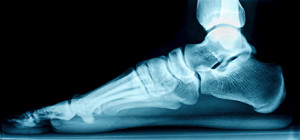
Adult-acquired flat feet, a condition marked by the gradual collapse of the arches, pose unique challenges for those affected. Unlike the common perception that flat feet only afflict children, this ailment can emerge in adulthood due to various factors. Weakening tendons, wear and tear over time, and injuries contribute to the loss of arch height, altering the foot's biomechanics. This can lead to pain, swelling, and difficulty with mobility. In some cases, underlying conditions such as arthritis exacerbate the problem. Individuals with adult-acquired flat feet may notice a progressive change in the shape of their feet and experience discomfort during prolonged standing or walking. While wearing supportive footwear and orthotics can alleviate symptoms, seeking professional guidance from a podiatrist is paramount. If you have flat feet, it is suggested that you are under the care of this type of doctor who can offer you relief techniques.
Flatfoot is a condition many people suffer from. If you have flat feet, contact Elliot T. Udell, DPM from New York. Our doctor will treat your foot and ankle needs.
What Are Flat Feet?
Flatfoot is a condition in which the arch of the foot is depressed and the sole of the foot is almost completely in contact with the ground. About 20-30% of the population generally has flat feet because their arches never formed during growth.
Conditions & Problems:
Having flat feet makes it difficult to run or walk because of the stress placed on the ankles.
Alignment – The general alignment of your legs can be disrupted, because the ankles move inward which can cause major discomfort.
Knees – If you have complications with your knees, flat feet can be a contributor to arthritis in that area.
Symptoms
- Pain around the heel or arch area
- Trouble standing on the tip toe
- Swelling around the inside of the ankle
- Flat look to one or both feet
- Having your shoes feel uneven when worn
Treatment
If you are experiencing pain and stress on the foot you may weaken the posterior tibial tendon, which runs around the inside of the ankle.
If you have any questions please feel free to contact our office located in Hicksville, NY . We offer the newest diagnostic and treatment technologies for all your foot and ankle needs.
The Dynamics of Adult Acquired Flat Feet

Adult-acquired flat feet, a condition marked by the gradual collapse of the arches, pose unique challenges for those affected. Unlike the common perception that flat feet only afflict children, this ailment can emerge in adulthood due to various factors. Weakening tendons, wear and tear over time, and injuries contribute to the loss of arch height, altering the foot's biomechanics. This can lead to pain, swelling, and difficulty with mobility. In some cases, underlying conditions such as arthritis exacerbate the problem. Individuals with adult-acquired flat feet may notice a progressive change in the shape of their feet and experience discomfort during prolonged standing or walking. While wearing supportive footwear and orthotics can alleviate symptoms, seeking professional guidance from a podiatrist is paramount. If you have flat feet, it is suggested that you are under the care of this type of doctor who can offer you relief techniques.
Flatfoot is a condition many people suffer from. If you have flat feet, contact Elliot T. Udell, DPM from New York. Our doctor will treat your foot and ankle needs.
What Are Flat Feet?
Flatfoot is a condition in which the arch of the foot is depressed and the sole of the foot is almost completely in contact with the ground. About 20-30% of the population generally has flat feet because their arches never formed during growth.
Conditions & Problems:
Having flat feet makes it difficult to run or walk because of the stress placed on the ankles.
Alignment – The general alignment of your legs can be disrupted, because the ankles move inward which can cause major discomfort.
Knees – If you have complications with your knees, flat feet can be a contributor to arthritis in that area.
Symptoms
- Pain around the heel or arch area
- Trouble standing on the tip toe
- Swelling around the inside of the ankle
- Flat look to one or both feet
- Having your shoes feel uneven when worn
Treatment
If you are experiencing pain and stress on the foot you may weaken the posterior tibial tendon, which runs around the inside of the ankle.
If you have any questions please feel free to contact our office located in Hicksville, NY . We offer the newest diagnostic and treatment technologies for all your foot and ankle needs.
Socks Can Affect Your Foot Health
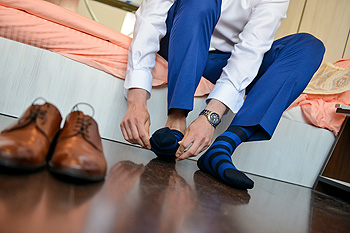
Whether you find yourself down to that last clean sock or debating the wisdom of going sockless inside your shoes, it is important to recognize the significance your sock choices can have on foot health. Clean socks play a pivotal role in maintaining foot hygiene, preventing infections, and ensuring overall comfort. Neglecting to change your socks can lead to consequences such as foot odor. This may be caused by the combination of sweat, bacteria, and dead skin cells. While not a direct health problem, dirty socks create an inviting habitat for bacteria and fungi. These can potentially lead to infections, such as athlete's foot or cellulitis. Trapping moisture, sweat, and bacteria against the skin also invites irritation, blisters, rashes, eczema, and dermatitis, all of which can make your feet more susceptible to infections. Re-wearing dirty socks is not recommended, as it can exacerbate foot problems and increase the risk of infections or skin irritations. Wearing the same pair for 24 hours can lead to moisture buildup, bacterial growth, and other potential foot-related issues. If you are dealing with infections, odor, or rashes on your feet, it is suggested that you schedule an appointment with a podiatrist to find the cause and receive treatment.
Everyday foot care is very important to prevent infection and other foot ailments. If you need your feet checked, contact Elliot T. Udell, DPM from New York. Our doctor can provide the care you need to keep you pain-free and on your feet.
Everyday Foot Care
Often, people take care of their bodies, face and hair more so than they do for their feet. But the feet are a very important aspect of our bodies, and one that we should pay more attention to. Without our feet, we would not be able to perform most daily tasks.
It is best to check your feet regularly to make sure there are no new bruises or cuts that you may not have noticed before. For dry feet, moisturizer can easily be a remedy and can be applied as often as necessary to the affected areas. Wearing shoes that fit well can also help you maintain good foot health, as well as making it easier to walk and do daily activities without the stress or pain of ill-fitting shoes, high heels, or even flip flops. Wearing clean socks with closed shoes is important to ensure that sweat and bacteria do not accumulate within the shoe. Clean socks help to prevent Athlete’s foot, fungi problems, bad odors, and can absorb sweat.
If you have any questions please feel free to contact our office located in Hicksville, NY . We offer the newest diagnostic and treatment technologies for all your foot and ankle needs.
Socks Can Affect Your Foot Health

Whether you find yourself down to that last clean sock or debating the wisdom of going sockless inside your shoes, it is important to recognize the significance your sock choices can have on foot health. Clean socks play a pivotal role in maintaining foot hygiene, preventing infections, and ensuring overall comfort. Neglecting to change your socks can lead to consequences such as foot odor. This may be caused by the combination of sweat, bacteria, and dead skin cells. While not a direct health problem, dirty socks create an inviting habitat for bacteria and fungi. These can potentially lead to infections, such as athlete's foot or cellulitis. Trapping moisture, sweat, and bacteria against the skin also invites irritation, blisters, rashes, eczema, and dermatitis, all of which can make your feet more susceptible to infections. Re-wearing dirty socks is not recommended, as it can exacerbate foot problems and increase the risk of infections or skin irritations. Wearing the same pair for 24 hours can lead to moisture buildup, bacterial growth, and other potential foot-related issues. If you are dealing with infections, odor, or rashes on your feet, it is suggested that you schedule an appointment with a podiatrist to find the cause and receive treatment.
Everyday foot care is very important to prevent infection and other foot ailments. If you need your feet checked, contact Elliot T. Udell, DPM from New York. Our doctor can provide the care you need to keep you pain-free and on your feet.
Everyday Foot Care
Often, people take care of their bodies, face and hair more so than they do for their feet. But the feet are a very important aspect of our bodies, and one that we should pay more attention to. Without our feet, we would not be able to perform most daily tasks.
It is best to check your feet regularly to make sure there are no new bruises or cuts that you may not have noticed before. For dry feet, moisturizer can easily be a remedy and can be applied as often as necessary to the affected areas. Wearing shoes that fit well can also help you maintain good foot health, as well as making it easier to walk and do daily activities without the stress or pain of ill-fitting shoes, high heels, or even flip flops. Wearing clean socks with closed shoes is important to ensure that sweat and bacteria do not accumulate within the shoe. Clean socks help to prevent Athlete’s foot, fungi problems, bad odors, and can absorb sweat.
If you have any questions please feel free to contact our office located in Hicksville, NY . We offer the newest diagnostic and treatment technologies for all your foot and ankle needs.

